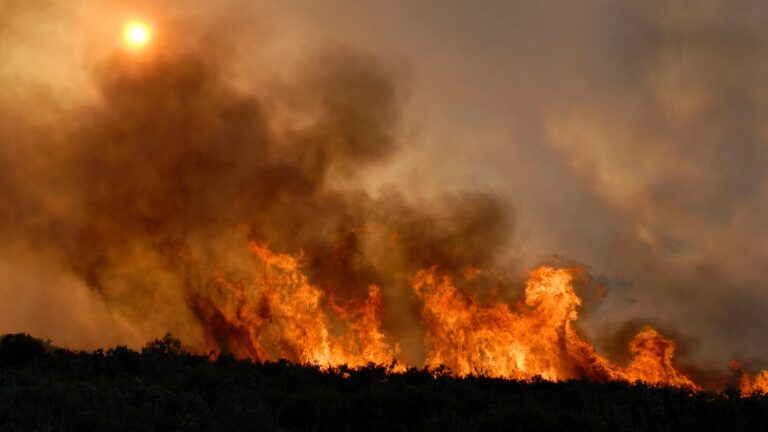Smoke from widespread wildfires in Canada has prompted air quality alerts across major cities including Toronto, Montreal, and several regions in the United States, authorities reported. The dense plumes have significantly degraded air conditions, raising health concerns and leading officials to issue warnings for vulnerable populations. As the wildfire season intensifies, residents are urged to take precautions amid continuing impacts on visibility and air safety.
Canada Wildfire Smoke Spurs Air Quality Alerts Across Toronto Montreal and U.S. Cities
Thick plumes of smoke from ongoing wildfires in Canada have severely impacted air quality in multiple metropolitan areas, prompting health officials to issue urgent alerts across Toronto, Montreal, and several U.S. cities. Airborne particulate matter levels have reached hazardous thresholds, forcing authorities to recommend residents limit outdoor activities and utilize air purifiers indoors. Vulnerable populations, such as children, the elderly, and those with respiratory conditions, are being urged to take extra precautions amid the deteriorating atmospheric conditions.
Environmental agencies across affected regions have deployed monitoring networks to track real-time air quality fluctuations, while emergency services remain on high alert. Key advisories include:
- Stay indoors: Especially during peak smoke hours to reduce exposure.
- Use N95 masks: When outdoor activities are unavoidable.
- Keep windows closed: To prevent indoor air contamination.
- Monitor official updates: For evolving forecasts and safety guidance.
| City | Air Quality Index (AQI) | Recommended Action |
|---|---|---|
| Toronto | 185 (Unhealthy) | Limit outdoor exposure |
| Montreal | 172 (Unhealthy for Sensitive Groups) | Wear masks outside |
| New York | 150 (Unhealthy for Sensitive Groups) | Reduce outdoor exertion |
| Boston | 140 (Unhealthy for Sensitive Groups) | Avoid strenuous activities |
Health Officials Issue Precautions for Vulnerable Populations Amid Rising Pollution Levels
Amid the escalating air quality warnings prompted by smoke drifting from Canada’s wildfires, health authorities have urged individuals in at-risk groups to take immediate safety measures. Elderly citizens, children, and those with respiratory or cardiovascular conditions are particularly vulnerable to the hazardous airborne particles and are advised to limit outdoor activities. Staying indoors with windows and doors closed, using air purifiers if available, and avoiding strenuous exercise are critical steps to mitigate health risks during this period.
To assist residents in navigating the dangerous air conditions, experts have outlined practical guidelines that include:
- Monitor local air quality indices regularly via government websites or apps.
- Use properly fitted masks such as N95 when outdoor travel is unavoidable.
- Follow prescribed medication routines diligently for those with asthma or heart disease.
- Seek medical attention promptly if symptoms such as chest pain, unusual shortness of breath, or severe cough develop.
| Population Group | Recommended Precautions | ||||||||||||
|---|---|---|---|---|---|---|---|---|---|---|---|---|---|
| Children | Avoid outdoor play; stay indoors during peak smoke hours | ||||||||||||
| Elderly | Limit outdoor exposure; ensure access to clean air spaces | ||||||||||||
| Respiratory Patients | Maintain medication regimen; use air filtration indoors | ||||||||||||
| General Public | Environmental Impact and Forecasts Point to Prolonged Air Quality Challenges Ahead
As wildfire seasons intensify in Canada, the smoke’s reach has extended far beyond provincial borders, affecting air quality in major urban areas such as Toronto and Montreal, as well as neighboring regions in the United States. The clouds of particulate matter and noxious gases drifting across thousands of miles pose immediate health risks, particularly for vulnerable populations including children, the elderly, and those with respiratory conditions. Experts warn that the frequency and duration of these events are on the rise due to changing climate patterns, which are fostering drier landscapes more susceptible to massive fires. Long-term forecasts suggest that air quality challenges might not diminish anytime soon. Environmental agencies are urging communities to prepare for sustained exposure to degraded air by implementing measures such as:
Key TakeawaysAs wildfire smoke continues to drift across North America, authorities in Toronto, Montreal, and parts of the United States remain vigilant, issuing air quality alerts and advising residents to take necessary precautions. Experts emphasize the importance of monitoring local air quality updates and limiting outdoor activities to protect public health. As the wildfire season progresses, officials urge communities to stay informed and prepared for ongoing environmental challenges. |




